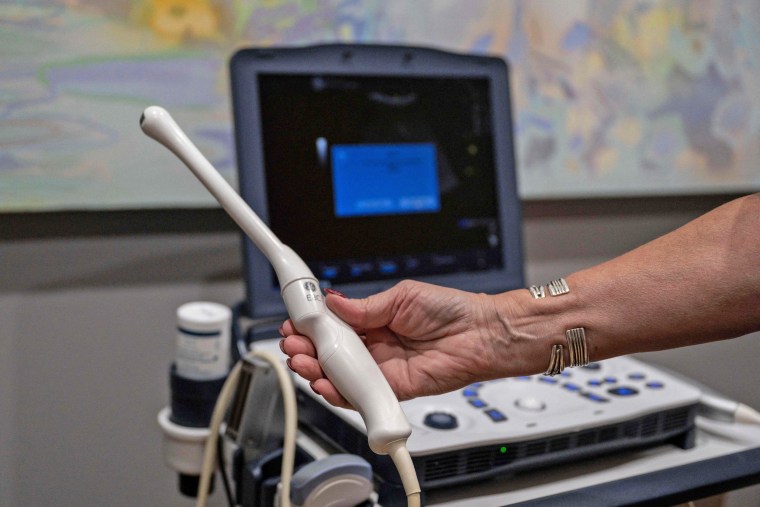WASHINGTON — Sen. Lindsey Graham's national 15-week abortion ban would likely force many women to undergo invasive transvaginal ultrasounds before terminating pregnancies, according to doctors.
Under the bill, which Graham introduced last week, physicians could be prosecuted for terminating pregnancies after 15 weeks, except in a handful of scenarios: to save the life of the mother or in cases where the pregnant woman or girl has previously reported that the pregnancy resulted from rape or incest.
Doctors would be on the hook to ask each patient about the timing of her pregnancy "and perform or cause to perform such medical examinations and tests" as needed to "make an accurate determination of gestational age."
Because violations of Graham's proposed 15-week ban would be punishable by up to five years in prison, doctors say the legislation would create a powerful incentive to perform transvaginal ultrasounds to make an age judgment.
"With just the liability riding on it, a lot of gynecologists may lean toward things like the ultrasounds because they want to cover themselves," said Karen Tang, a gynecologic surgeon in Pennsylvania. The most accurate medical exams for assessing gestational age are ultrasounds, she added, and they are "almost always done transvaginally" in the early months of pregnancy.
Jennifer Lincoln, an obstetrician in Oregon, said that the language of the age-determination provision is “vague,” but agreed, “most people will interpret [that] as an ultrasound.”
Even then, said Ben Hamar, a maternal fetal medicine specialist in Massachusetts, uncertainty around gestational age estimates, which can range as much as a couple of weeks, means the Graham bill would have a "chilling effect" on doctors, making them less likely to terminate pregnancies within a week or two of the 15-week mark. "The ultrasound is only so accurate,” Hamar said.
With Democrats in control of the House, Senate and White House, Graham’s bill stands no chance of advancing this year. But it immediately raised the stakes for November’s midterm elections, the first since the Supreme Court’s Dobbs decision overturned federal abortion protections and opened a path for new national and state-level limitations on the practice.
A decade ago, a public backlash forced Virginia Republicans to drop similar transvaginal ultrasound provisions from a state measure that was designed to ensure more women would see images of developing babies before terminating their pregnancies.
Graham’s office did not reply to a request for comment.
Before he introduced his bill, Graham's effort was expected by some in the GOP to help Republicans reset the politics of abortion. Democrats gained traction with voters following the Supreme Court's June decision, and Republicans have been looking for ways to counter that momentum. But Graham's measure ended up highlighting fractures in the GOP, with Republican strategists questioning the wisdom of his timing and some candidates keeping their distance.
In New Hampshire, Republican Senate nominee Don Bolduc, who opposes federal lawmaking on abortion, raised eyebrows Sunday when he said in a local interview that Sen. Maggie Hassan, D-N.H., is out of step with state voters because she supports abortion rights and that she should "get over it." Polls show that most of the state's voters consider themselves "pro-choice."
Graham's abortion ban has won the support of Sen. Marco Rubio, R-Fla., who is running for re-election; Rep. Ted Budd, R-N.C., who is seeking a Senate seat in his state; and GOP Senate nominees Herschel Walker in Georgia and Blake Masters in Arizona.
But for some Republicans in contested congressional races, the idea of a federal law runs counter to decades of the party insisting that the issue should be decided at the state level. For others, the details of Graham's ban are politically tricky, especially in states that have passed different abortion restrictions in recent years.
Right now, it is not uncommon for doctors to prescribe abortion-inducing drugs during telemedicine appointments. The Graham bill’s age-determination requirement could effectively put an end to that means of early termination of pregnancy as well.
The Mississippi law under consideration in the Dobbs case bans abortions in the state after 15 weeks, except in instances involving severe fetal abnormalities — which often can't be detected until the later stages of pregnancy — or a medical emergency that would put the woman's life or long-term health at risk. It has a gestational-age provision that is similar to Graham's.

